What follows comes in full from a most impressive source. For info on all 'muscle cars', go to
Oldsmobile 442
![]()
1964-1973
There are those who claim that it was Oldsmobile that created the
first muscle car when it stuffed its hot new fullsize Rocket V8 into its midsize
model to create the Olds 88 and Super 88 series back in 1949. But it wasn't
until 1964 that Oldsmobile would return to the concept, encouraged by the
success of the Pontiac GTO. Oldsmobile was the first GM division to follow
Pontiac's lead, and began to offer fullsize muscle in its midsize Cutlass model.
The package included the top engine available from Oldsmobile, a 330 cid V8 with
the police package. It was named the 4-4-2 package, originally signifying the
engine's 4 barrel carb, 4 speed manual transmission, and dual (2) exhausts.
Although the specifications would change through the years, the name stuck.
Although never the fastest or the best seller of the GM A-bodies, the 4-4-2 was
known for its balanced performance, exceptional handling and the "W" and Hurst
editions that would come out in later years.
1964 Oldsmobile Cutlass 4-4-2
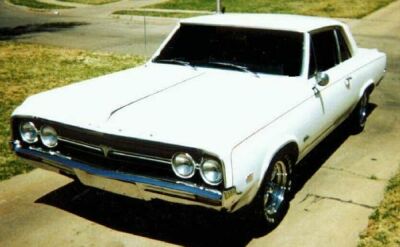
Oldsmobile was the first to respond to Pontiac's GTO by taking the
best engine they had, a 330 cid V8 modified with all available police issue
equipment including a dual-snorkel air cleaner and premium quality rod and main
bearings. The package included a 4 barrel carburetor, 4 speed manual
transmission, and dual exhausts, which gave it the name of 4-4-2. The package
also included heavy-duty shocks, springs, and a rear stabilizer bar. The 4-4-2
package was technically available on all Oldsmobile midsize cars, including the
cheaper F-85 and more luxurious Cutlass, except station wagons (it was therefore
possible to have a four door 4-4-2). Due to a late introduction and a confusing
promotion campaign, only 2,999 4-4-2's were sold in 1964. This would soon
change.
Production:
Holiday 2D Hardtop: 2,999
Engines:
330 V8 310bhp @ 5200 rpm, 355 lb-ft @ 3600 rpm.
Performance:
330/310: 0-60 in 7.4 sec, 1/4 mile in 15.6 sec @ 89 mph.
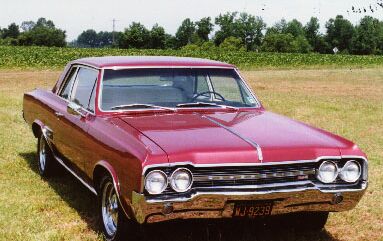
Oldsmobile finally got the 4-4-2 package right for 1965. They
eliminated four door models and made it optional on all two door F-85s and
Cutlass models. The previous engine was replaced with a new 400 cid engine,
generating 345bhp and 440lb-ft. The name now signified the 400 cid engine, 4
barrel carb, and dual exhausts. The package included heavy duty issue shock
absorbers and springs, battery, clutch, front and rear stabilizer bars, fat
tires, and 4-4-2 badges. Marketing was much more youthful and organized, and
sales improved to 25,003. Critics pronounced the 4-4-2 as one of the best
handling of the intermediate muscle cars and an all around balanced performer.
Production:
Holiday 2D Hardtop: 21,535
Convertible: 3,468
Engines:
400 V8 345 bhp @ 4800 rpm, 440 lb-ft @ 3200 rpm.
Performance:
400/345: 0-60 in 5.5 sec, 1/4 mile in 15.0 sec @ 98 mph.
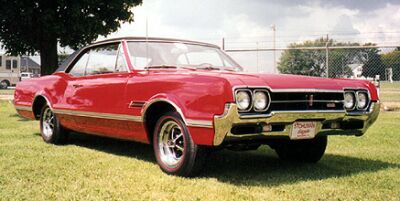
1966 saw new sheetmetal for the Oldsmobile midsize line, and a new
option under the hood. The F-85 and Cutlass models had a pronounced hump over
the rear windows and large C-pillars that extended beyond the rear windshield.
The base engine was tuned to generate an extra 5 bhp, but the big news was the
introduction of Oldsmobile's first tri-carb option since the late 1950s. This
boosted output to 360 bhp and the transition between the carbs was smooth. A
long list of options were available including five transmissions and eight axle
ratios. Handling remained top-notch due to suspension upgrades and critics again
proclaimed the 4-4-2 as the most balanced muscle car. Oldsmobile also quietly
made available a new performance option only for the triple carb engine that
consisted of an air-induction system, front bumper openings and internal engine
modifications. The option was known as W-30.
Production:
2D Coupe: 1,430
2D Sport Coupe: 3,937
Holiday Hardtop Coupe: 10,053
Hardtop Coupe: 3,827
Convertible: 2,750
Engines:
400 V8 350 bhp @ 5000 rpm, 440 lb-ft @ 3600 rpm.
(3x2 bbl) 400 V8 360 bhp @ 5000 rpm, 440 lb-ft @ 3600 rpm.
Performance:
400/350: 0-60 in 7.1 sec, 1/4 mile in 15.5 sec @ 91 mph.
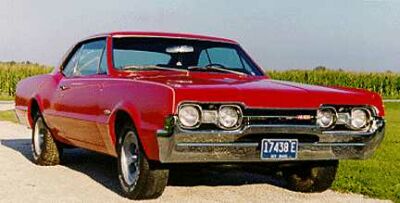
No sooner had Oldsmobile released its tri-carb setup, GM banned such
setups for all of its divisions. Undaunted, Oldsmobile introduced two new engine
options for its 4-4-2. The first was option L66, the "Turnpike Cruising package"
which included a detuned 400 cid engine with a two barrel carb. Of greater
interest to enthusiasts was the return of the W-30 package. This "forced air
induction system" included special air ducts, fan shroud, camshaft, heavy duty
springs, and chrome valve covers and an air induction air cleaner that had huge
hoses connecting it to special air induction slots above and below the parking
lights. The 4-4-2 package was now only available on the higher price Cutlass
models, which combined comfort and performance.
Production:
2D Sport Coupe: 5,215
Holiday Hardtop Coupe: 16,514
Convertible: 3,104
Engines:
(L66) 400 V8 300 bhp @ 4600 rpm, 425 lb-ft @ 2600 bhp.
400 V8 350 bhp @ 5000 rpm, 440 lb-ft @ 3600 rpm.
(W-30) 400 V8 360 bhp @ 5000 rpm, 440lb-ft @ 3600 rpm.
Performance:
(W-30) 400/360: 0-60 in 6.7 sec, 1/4 mile in 14.98 sec @ 95mph.
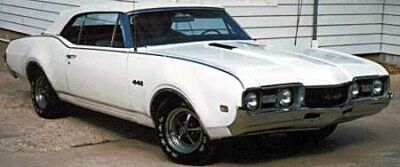
1968 would prove to be a dramatic year for the 4-4-2. For the first
time, the 4-4-2 became its own model, still based on the Oldsmobile A-body
midsize platform. For 1968, all GM A-body two doors lost three inches of
wheelbase and gained shapely new sheetmetal. Although both the standard and
Force Air induction engines sported an increased stroke and decreased bore (the
opposite of general practice), their displacement and power ratings remained the
same. The Force Air engine now had air intakes positioned under the bumpers
while the Turnpike Cruiser engine was detuned slightly. The big news for
enthusiasts was the introduction of the Hurst/Olds. The prototype had been
designed as a one-off by Jack "Doc" Watson for his boss George Hurst, the
designer of the Jaws of Life and the most respected name in transmissions.
Watson took a 4-4-2 and dropped in the 455 cid V8 from the Oldsmobile Toronado.
Encouraged by the success of the transplant, Jack Watson was able to convince
Oldsmobile executives to authorize a limited run of Hurst/Olds. All Hurst/Olds
featured Force Air systems and Turbo Hydromatics with Hurst Dual-Gate shifters
and came in only one color combination, Peruvian Silver with Black accent
stripes and rear-deck panel. Only 515 were produced for 1968, and they are
highly prized today.
Production:
2D Sport Coupe: 4,282
Holiday Hardtop Coupe: 24,183
Convertible: 5,142
Engines:
(L66) 400 V8 290 bhp @ 4600 rpm, 425 lb-ft @ 2600 bhp.
400 V8 350 bhp @ 5000 rpm, 440 lb-ft @ 3600 rpm. (Manual transmission)
400 V8 325 bhp @ 5000 rpm, 440 lb-ft @ 3600 rpm. (Automatic transmission)
(W-30) 400 V8 360 bhp @ 5000 rpm, 440lb-ft @ 3600 rpm.
(Hurst/Olds) 455 V8 390 bhp @ 5000rpm, 500 lb-ft @ 3200 rpm.
Performance:
(Hurst/Olds) 455/390: 0-60 in 5.4 sec, 1/4 mile in 13.9 sec @ 103 mph.
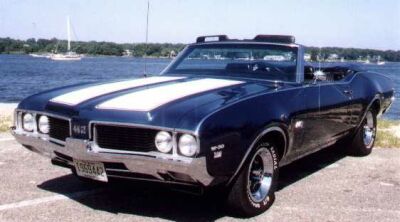
1969 saw the introduction of several "W" options on the 4-4-2 which
sported a new grill design. The W-30 option returned with its Force Air
induction, and below bumper intakes. A new W32 option replaced the "Turnpike
Cruiser" option and incorporated a detuned Force Air induction engine. This was
joined by the W-31, which was available on several F-85 and Cutlass models. This
package incorporated a 350 cid small block with a special carb, valves, and
camshaft. The Hurst/Olds returned, with a new regal gold and white color scheme,
outrageous hood scopes and the 455 cid V8 that was detuned slightly from 1968.
Production:
2D Sport Coupe: 2,475
Holiday Hardtop Coupe: 24,193
Convertible: 2,933
Engines:
(W-31) 350 V8 325 bhp @ 5600 rpm, 360 lb-ft @ 3600 bhp.
400 V8 350 bhp @ 5000 rpm, 440 lb-ft @ 3200 rpm. (Manual transmission)
400 V8 325 bhp @ 5000 rpm, 440 lb-ft @ 3000 rpm. (Automatic transmission)
(W-32) 400 V8 350 bhp @ 4800 rpm, 440 lb-ft @ 3200 rpm.
(W-30) 400 V8 360 bhp @ 5400 rpm, 440lb-ft @ 3600 rpm.
(Hurst/Olds) 455 V8 380 bhp @ 5000rpm, 500 lb-ft @ 3200 rpm.
Performance:
(Hurst/Olds) 455/380: 0-60 in 5.9 sec, 1/4 mile in 14.03 sec @ 101 mph.
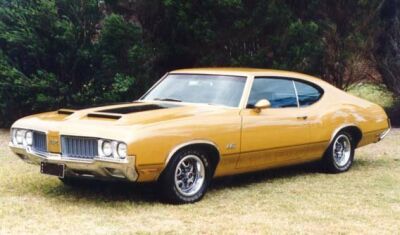
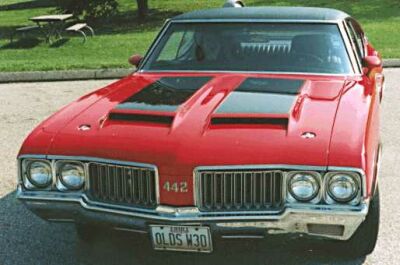
1970 saw the lifting of GM's ban on engines greater than 400 cid
installed in midsize cars. Although Oldsmobile had gotten around that rule in
1968 and 1969 through the Hurst/Olds, this now enabled Oldsmobile to offer its
455 cid V8 in all 4-4-2s. The Hurst/Olds was dropped from the lineup and
wouldn't reappear until 1972. The W-30 hit its performance peak and included a
balanced and blueprinted 455 V8 with a hotter cam, performance carb,
low-restriction exhausts and the Force Air induction system which utilized two
prominent scoops on the hood. The W-30 package also included a lightweight
fiberglass hood, plastic inner fenders, aluminum diferential carrier and cover,
and less sound insulation in an attempt to cut weight and improve performance.
The W-30 option was offered only on Cutlass models, but a new option, the Rallye
350, was offered. Powered by a 350 cid engine, the smallest displacement
Oldsmobile muscle car sported the most outrageous exterior, which was only
painted in a very bright yellow. Even the bumpers and wheels were painted
yellow. This would be only a one year option as the performance market would
collapse after 1970.
Production:
2D Sport Coupe: 1,688
Holiday Hardtop Coupe: 14,709
Convertible: 2,933
Engines:
(Rallye 350) 350 V8 310 bhp @ 4200rpm, 490 lb-ft @ 2400 rpm.
455 V8 365 bhp @ 5000 rpm, 500 lb-ft @ 3200 rpm.
(W-30) 455 V8 370 bhp @ 5200 rpm, 500 lb-ft @ 3600 rpm.
Performance:
(W-30) 455/370: 0-60 in 5.7 sec, 1/4 mile in 14.2 sec @ 100mph.
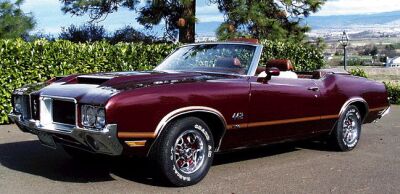
1971 saw the beginning of the end for all muscle cars, and the 4-4-2
was no exception. To comply with a GM decree that all engines must be able to
run on unleaded fuel, all engines saw a drop in compresion and a corresponding
drop in power ratings. This was further compounded by the move to rate engines
with all accessories attached (the "net rating") which lead to some drastic
changes over the previous "gross" ratings. The standard 455 dropped to 270bhp
net (340bhp gross) while the W-30 dropped to 300bhp net (350bhp gross). The W-31
and Rallye 350 were dropped, and the Hurst/Olds was still unavailable, but the
W-30 was still available for the enthusiasts, and sported the familiar Force Air
induction system and the 1970 hotter cam.
Production:
Holiday Hardtop Coupe: 6,285
Convertible: 1,304
Engines: (SAE Net)
455 V8 270 bhp @ 4600 rpm, 370 lb-ft @ 3200 rpm.
(W-30) 455 V8 300 bhp @ 4700 rpm, 410 lb-ft @ 3200 rpm.
Performance:
(W-30) 455/300: 0-60 in 6.5 sec, 1/4 mile in 14.8 sec @ 98 mph.
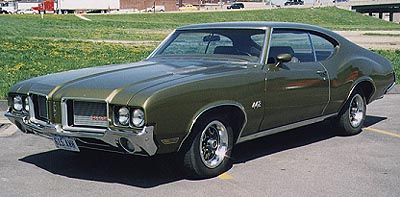
The 4-4-2 reverted back to an option on the Cutlass models for 1972 as
the market turned away from gas guzzling, high insurance cost muscle cars. The
4-4-2 package became just a handling and appearance package available on any V8
Cutlass and included a heavy-duty suspension, wheels, and appearance items. For
those who still craved performance, the W-30 option was still available, with
its Force Air induction 455 V8 and enthusiasts cheered the return of the
Hurst/Olds, although it was nothing like the 1968-1969 models. The Hurst/Olds
was only available in Cameo White with black and gold accents and could be order
with numerous luxury options.
Production:
Holiday Hardtop Coupe: ?
Convertible: ?
Engines: (SAE Net)
350 V8 160 bhp @ 4000 rpm, 275 lb-ft @ 2400 rpm.
350 V8 180 bhp @ 4000 rpm, 275 lb-ft @ 2800 rpm.
455 V8 250 bhp @ 4200 rpm, 370 lb-ft @ 2800 rpm.
(Hurst/Olds) 455 V8 300 bhp @ 4700 rpm, 370 lb-ft @ 2800 rpm.
(W-30) 455 V8 300 bhp @ 4700 rpm, 410 lb-ft @ 3200 rpm.
Performance:
NA
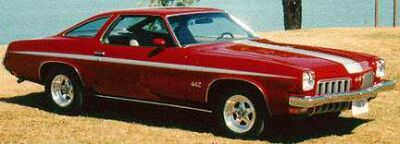
1973 saw a drastic change to the shape of the Cutlass as it gained all
new sheetmetal and a new euro look. The 4-4-2 package was now labeled as the
W-29 option and was only available on the Cutlass and Cutlass S coupes. The
package included the same handling and appearance items as the year before. The
W-30 option was dropped from from the lineup leaving only the Hurst/Olds to
carry the performance banner. The Hurst/Olds came in Cameo White or Ebony Black
with gold stripes and a white vinyl roof. But the fancy trim couldn't hide the
loss of 50bhp as the 455 was further detuned to meet increasingly tough emission
standards. Hurst/Olds models would be built in 1974, 1975, 1979, 1983, and 1984.
But none of the successors could match the power of the originals. Oldsmobile
withdrew from the performance market after 1973, and although the 4-4-2 name
would later resurface on numerous models in the next two decades, none of them
could match the sheer brute strength of the true muscle car models of the
sixties and early seventies.
Production:
Holiday Hardtop Coupe: ?
Convertible: ?
Engines: (SAE Net)
350 V8 180 bhp @ 3800 rpm, 275 lb-ft @ 2800 rpm.
455 V8 250 bhp @ 4000 rpm, 370 lb-ft @ 2100 rpm.
(Hurst/Olds) 455 V8 250 bhp @ 4000 rpm, 370 lb-ft @ 2100 rpm.
Performance:
NA